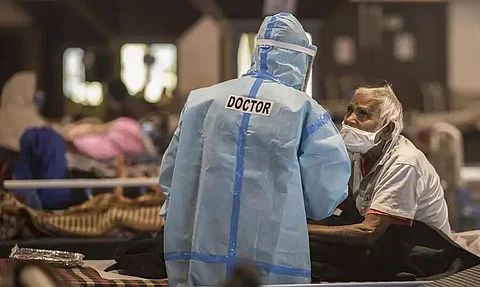
- Home
- Live Blog
- Breaking News
- Top Headlines
- Cities
- NE News
- Sentinel Media
- Sports
- Education
- Jobs

Lessons from the second wave. India today seems to be in the exact same situation that the UK was in mid-December. First, an exponential number of people testing Covid positive followed a week later by an exponential increase in the number of hospitalizations followed 2 weeks later by an exponential increase in Covid deaths. Here are some of the lessons learned
1. 99% of Covid positive recover on their own. The only things needed for them are oxygen level monitoring to make sure sats are >93, paracetamol (Crocin or Dolo) for fever and body ache, and home isolation to make sure they do not pass it on to others. There is no need or benefit in giving plasma, remdesivir, ivermectin, hydroxychloroquine, antibiotics or even steroids, blood thinners, or tocilizumab to this 99%. There is NO need for hospitalization as long as oxygen levels are above 93%.
2. Covid is an illness that affects a lot of people at the same time, however, it is how severely it affects the 1% who are unlucky enough to have severe covid which makes it the dreaded illness it is. All our medical resources (hospital beds, oxygen cylinders, etc) need to be saved for this severely affected 1 % and not the 99% with mild illness irrespective of wealth, contacts, influence, etc.
3. For the 1% that have a severe illness the only medications that have been found to have significant benefit are steroids and blood thinners. Tocilizumab also has been found to have benefits (only 4%) and should be given whenever available. Remdesivir has a very minimal benefit (no mortality benefit at all) and should be given if available however the patient does not lose much if not given. However, it will be wrong to call either of them (tocilizumab/remdesevir) life-saving in Covid.
4. Plasma has been extensively studied and found to be of no benefit. This is after painstaking analysis of 11,000 patients given plasma vs 11,000 not given plasma. It should NOT be given. It uses up a significant amount of resources with no benefit.
5. Hydroxychloroquine/Ivermecin. No serious medical organization in the world found any benefit in giving them and should not be given. However, they are cheap and relatively harmless.
6. Oxygen shortage - Many hospitals in the UK had to stop admitting patients due to running out of oxygen for short periods of time. We only need to give enough oxygen for levels to be above 93 to 94. There is often a tendency to turn oxygen flows to the highest levels possible. This has to be avoided.
7. Vaccine. In London before the vaccine all our ICUs were full, all theatre recoveries were full, all cardiac HDUs, etc were full of intubated covid patients and we were transferring intubated covid patients to as far as Scotland, Bristol, etc in helicopters to relieve ICU capacity in London. After the vaccine, we have hardly any hospital admissions and almost nil new ICU admissions. However, this could also have been due to the serious nature of the lockdown.
8. Rationing of resources. In the UK every patient who needed a hospital bed got one and every patient who was suitable for an ICU bed got one. This was only possible as there were strict criteria for hospital admission which meant that the 99% of Covid positive who do not need oxygen were not hospitalized. This needs to be done strictly in India as well.
9. Once someone has tested covid positive there is no need to get retested to see if they are still covid positive. This unnecessary re-testing results in wastage of testing resources. Once 2 weeks of home isolation following the date of onset of symptoms is complete a person is considered covid negative and non-infectious.
----Written by Dr Nishit Sud
Anesthetics/Critical Care, NHS London